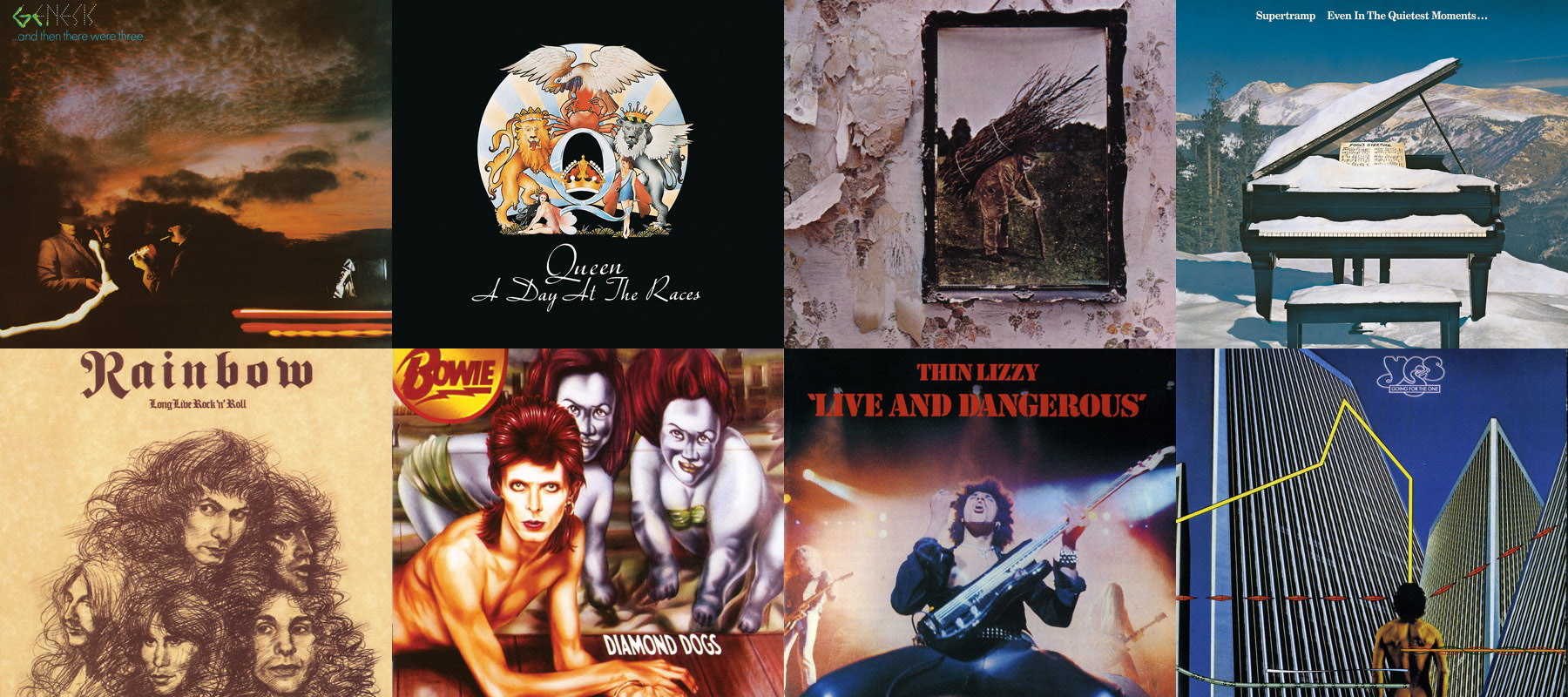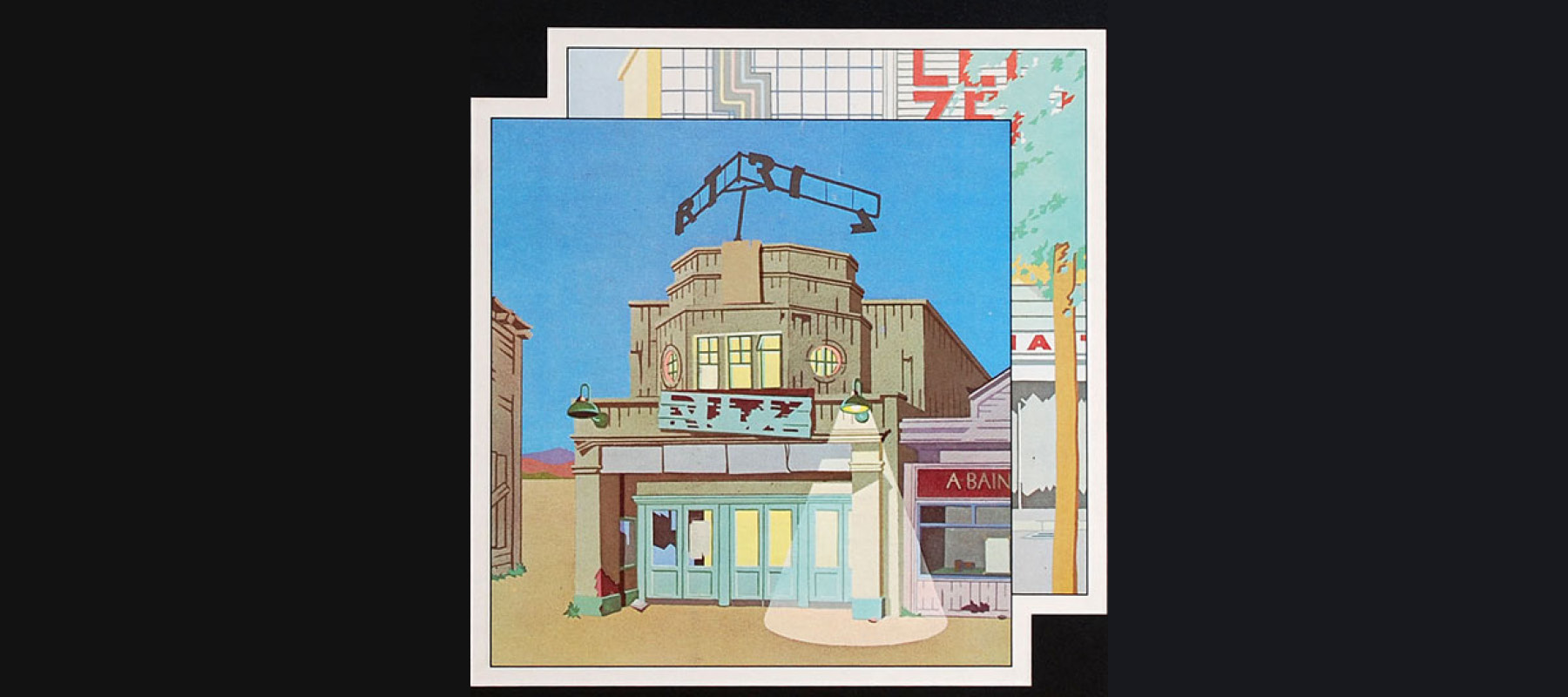Reflections on Led Zeppelin Part 2

In Through the Out Door is Led Zeppelin’s eighth and final studio album, assuming we are not counting Coda, the compilation of previously unreleased tracks that was issued two years after the band had officially disbanded following drummer John Bonham’s death. It came out on 22 August 1979, three or so weeks after the first of their two Knebworth concerts and a whopping three-and-a-half years after their previous studio album, Presence.
Two initial points about In Through the Out Door: it is the first Zeppelin album that I bought at time of release and – unrelated to that, I think – I like it more than most Zep fans seem to. Check out any Zeppelin album-ranking video on YouTube and you will very likely find Coda propping up the list – that’s fair enough though, as I say, I personally don’t think of Coda as a genuine studio album (but it is an inspired title!) – with In Through the Out Door perched just above it.
(Next on the list – going in ascending order – will probably be Presence followed by Houses of the Holy, and then the first four albums, and finally Physical Graffiti in the top spot. For what it’s worth, I have done my own Zeppelin album ranking at the end of this blog.)
I can recall In Through the Out Door getting a scathing two-stars-out-of-five review in Sounds magazine. The reviewer was Geoff Barton, the standard bearer for heavy rock in a music paper whose journalists much preferred punk. (Incidentally, a young Sounds writer at the time who championed a hardcore subgenre of punk labelled Oi! was Garry Bushell, who later became the TV reviewer in tabloids like the Sun. Barton himself went on to edit the first issue of Kerrang!, itself an offshoot of Sounds.)
The paper had already panned two gigs that the band played in Copenhagen as warmups for Knebworth, and Barton’s album review dripped with schadenfreude. In the Evening was classic Zeppelin, he opined, but everything else (All My Love partly excepted) was an embarrassment. Barton, a huge Kiss fan, was taking a hefty amount of flak in the letters pages for the disco-influenced sound of the recently released Dynasty album, so he took particular delight in mocking the synth-heavy Carouselambra (winner of the oddest Zeppelin song title award), particularly the up-tempo synth solo that starts at roughly seven minutes in.
In Through the Out Door was, we read, a difficult album to record, with Jimmy Page at a low ebb physically and creatively (Chris Salewicz writes: “Frozen in his heroin addiction, Page had minimal input” – page 396) and Bonham, well, an alcoholic. But I like its bright, clean sound (with the exception of the vocals on Carouselambra which are so buried in the mix that the lyrics are all but indecipherable), and the extensive use of keyboards makes In Through the Out Door a much more varied and interesting listen than Presence (of which, more below). It is John Paul Jones’ most distinctive and impactful contribution to Zeppelin’s body of work since No Quarter six years earlier.
The opening In the Evening and side two’s All My Love are indeed excellent. I have never been an enthusiast for bluesy dirges (the dictionary definition of a dirge is ‘a mournful song’) and so I would probably have wrapped things up with the raucous Wearing and Tearing, which made a belated appearance on Coda, rather than I’m Gonna Crawl. But songs like Southbound Suarez and Hot Dog hold up against, say, Dancing Days and D’yer Mak’er (which gets the worst Zeppelin song title prize) on the much more highly regarded Houses of the Holy album.
That said, 1973’s Houses of the Holy, the band’s fifth album, is fated to sit forever in the shadow of the untitled fourth album. Over the Hills and Far Away and The Ocean are both great tracks, but The Grunge is nothing more than a filler – and not a particularly good one at that.
I find Thin Lizzy’s classic early studio albums – Nightlife (1974) to Bad Reputation (1977) – hard to listen to because my introduction to Lizzy’s music was their exceptional 1978 live album, Live and Dangerous. Ditto Zeppelin’s Houses of the Holy: three of its standout tracks – The Song Remains the Same, The Rain Song and No Quarter – are outshone by the versions that appear on the 1976 live soundtrack album, The Song Remains the Same, which was my introduction to Zeppelin. [Click to read Part 1 for more about this.] The moral of the story: don’t introduce yourself to a band’s music via a live album.
An album that I don’t appear to rate as highly as most Zep fans is their third one. Led Zeppelin III has its epic moments, of course: Immigrant Song and Since I’ve Been Loving You are majestic, and the gentler Tangerine and That’s the Way explore a folksy side to Zeppelin only hinted at on the first two albums. But other tracks – Friends, Out on the Tiles and Bron-Yr-Aur Stomp – are mediocre by Zep standards and the closing Hats Off to (Roy) Harper (no surprises that it is based on an old blues number) probably ranks as my least favourite song of theirs. Hey, Hey, What Can I Do, which was released as the b-side of Immigrant Song in the USA, would have been a much better pick.
Their first album, Led Zeppelin, also has its peaks and troughs. Good Times Bad Times, Dazed and Confused, Communication Breakdown and How Many More Times are excellent, but overall – and in spite of its hard-rock edge – the album draws too heavily on the band’s blues influences for my taste.
Led Zeppelin II draws liberally from the same well but nevertheless seems to offer something genuinely groundbreaking – a musical manifesto for a new decade (it was released in late October 1969). Eclectic and experimental, Led Zeppelin II sounds like a band still taking inspiration from but no longer constrained by their heritage. Or maybe the songs are just better.
Robert Plant once described himself to the journalist Cameron Crowe as “a golden god”. It is a rather tired cliché but the phrase ‘rock gods’ certainly captures some of the aura that surrounded Led Zeppelin – or, perhaps more accurately, that the band projected – in their heyday: irresistible, all-conquering, indestructible, and also distant and aloof, much like the ancient Greek gods that were once believed to reside on Mount Olympus, in fact.
A trope of ancient Greek tragedy was the concept of hubris – defined as excessive pride and dangerous overconfidence – followed by nemesis: punishment (by the gods), prolonged bad luck and ultimately downfall. It is a rich seam that has been continually mined during the last two millennia of storytelling. (At its simplest, think of any bighead-gets-his-comeuppance story.) And it is an interesting lens through which to observe Zeppelin’s unravelling in the second half of the decade.
The year 1975 appeared to start so well for them. Physical Graffiti – not just an ambitious, sprawling double album but also the band’s first release on their own Swan Song label – came out in February and was an instant critical and commercial triumph. Another high-grossing, hellraising tour of North America, with the band criss-crossing the continent aboard the aptly named Starship, was followed by a series of eagerly anticipated shows at Earls Court in London, originally three but extended to five by popular demand.
It is worth pausing briefly at Earls Court in May 1975 – Saturday 24 May 1975, to be precise – to listen in on some of Plant’s between-song chats with the crowd. (The concert is available as audio and video more or less in its entirety on YouTube and elsewhere.)
Introducing a show that will last well over three hours, Plant informs the audience that the band intends to take them “on a little journey of the experiences that we’ve had – the more pleasurable ones and some of the dark ones that have led to the music that has been so different in six-and-a-half years”. They may be rock gods, in other words, but it isn’t all paradise in paradise.
It is well known that Plant has long been reluctant to perform Stairway to Heaven, Zeppelin’s magnum opus in the eyes of many rock music fans. If at first he was fed up with the song’s ubiquity (he once donated $10,000 to a community radio station in Oregon in return for their pledge never to play the song again), the issue in more recent times seems to be Plant’s wish to distance himself from the song’s sentiments – “coming from the mind of a twenty-three-year-old”, he told one interviewer. (He was actually twenty-two when he wrote the lyrics).
According to Mick Wall, Plant only agreed to the song’s inclusion in the set list for the 02 Arena show in 2007 on condition that it was played midway during the set and without any fanfare. He also says that Plant had to be persuaded to leave in the “Does anyone remember laughter?” ad lib for the DVD release of The Song Remains the Same.
Plant was four years older by the time of the Earls Court shows, but he was still – or at least affected to be – the carefree hippie who sang of girls with love in their eyes and flowers in their hair. He says this as they settle on their stools at the front of the stage before playing Going to California: “This is a song about the would-be hope for the ultimate… erm… for the ultimate.” Whatever that means.
But for all this counterculture idealism, mammon was as important to Led Zeppelin as music:
It really is a treat to be playing in England again – or playing in Britain again. It makes us sound like foreigners, but somebody voted for somebody and everybody’s on the run. There’s very little people [sic] left in the business that we know to talk to anymore. We have to talk to passers-by on the street and cyclists and members of the public. This is for anybody who’s got any hope that everything can be okay in our wonderful country again. Everything can be grown from the seeds of goodness, right, and without becoming a prophet we ain’t doing too good at the moment.
Later, introducing Dazed and Confused, Plant adds:
So we’re really having a good time back in good old England. We gotta fly soon. You know how it is with Denis, dear Denis. Private enterprise. No artists in the country any more. He must be Dazed and Confused…
‘Denis’ refers to Denis Healey, the UK’s chancellor of the exchequer between 1974 and 1979. Income tax rates were much higher in Britain and across much of the developed world in the 60s and 70s than they are now. The incoming Labour government had increased the top rate of income tax from 75% to 83%, and the overall rate on investment income was as high as 98%.
Some wealthy celebrities became tax exiles, moving abroad temporarily or permanently to avoid paying tax in the UK, as did the members of Led Zeppelin (and Peter Grant). They were permitted to be in Britain for no more than thirty days during the 1975–76 tax year. Plant’s comment to the crowd at the end of the final Earls Court show was: “If you see Denis Healey, tell him we’ve gone.”
But tax headaches were far from the only problem by 1975. The rock-god lifestyle – sex, drugs, rock ‘n’ roll, more sex, more drugs, even more sex, even more drugs – was taking its toll. Cocaine and other illegal substances had always been freely available but now heroin, a much more destructive drug, was the narcotic of choice. Bonham (referred to by members of the Zeppelin entourage as ‘the Beast’, which was not meant as a compliment) was increasingly prone to bouts of alcohol-fuelled violence: Mick Wall describes him as a ‘droog’ on and off the stage. (Droogs were a gang of vicious thugs in the book and film A Clockwork Orange; Bonham had adopted their look on stage.) Stephen Davis, in his book Hammer of the Gods, writes of “a loose cannon, fully loaded and banging around the deck, destroying anything in his way” (page 258).
Worse was to follow. Plant and his family were involved in a serious car accident on the Greek island of Rhodes, and plans for yet another North American tour in August–September were abruptly cancelled.
Presence, released in March 1976, was the album that eventually emerged from the literal and metaphorical wreckage. Written in the autumn of 1975, it was actually recorded in less than three weeks, with minimal creative input from anyone except Page who, says Mick Wall, rushed to complete the album in marathon eighteen-hour-plus sessions fuelled by heroin (page 370).
True, Achilles Last Stand – the title an ironic nod, presumably, to Plant’s extended confinement to a wheelchair after the accident – is a frenetic ten-minute epic built around layered guitars and powerhouse drumming. But the album as a whole, featuring no keyboards and virtually no acoustic guitar, lacks the variety, ambition and moments of inspiration that make Physical Graffiti such a masterpiece.
Above all, the optimism that helped songs like Stairway to Heaven and Kashmir to soar – “Oh, father of the four winds fill my sails / Cross the sea of years” – has all but evaporated, to be replaced by a sense of isolation and despair. Los Angeles, for years the band’s playground, is now “the city of the damned”, and the frequent allusions to narcotics – “Paying through the nose”, “Got a monkey on my back” – are impossible to miss.
Tea for One ends the album on a suitably downbeat note, both musically and lyrically:
There was a time that I stood tall
In the eyes of other men
But by my own choice I left you woman
And now I can’t get back again
Led Zeppelin did not play live again until April 1977, the start of a shambolic North American tour that was cut short following the death of Plant’s five-year-old son, Karac, from a viral infection unrelated to the 1975 car crash. Their next – final – concerts in the UK were not until Knebworth in 1979, more than four years after their Earls Court triumph. Bonham died of alcohol poisoning the following year.
To conclude, here is my ranking of Led Zeppelin’s albums (worst to best):
8. Presence (1976)
7. Led Zeppelin (1969)
6. Led Zeppelin III (1970)
5. Houses of the Holy (1973)
4. In Through the Out Door (1979)
3. Led Zeppelin IV (1971)
2. Led Zeppelin II (1969)
1. Physical Graffiti (1975)
The books referred to in this blog are:
Stephen Davis, Hammer of the Gods, 1995 edition
Mick Wall, When Giants Walked the Earth, 2009 edition
Chris Salewicz, Jimmy Page: The Definitive Biography, 2018 hardback edition





